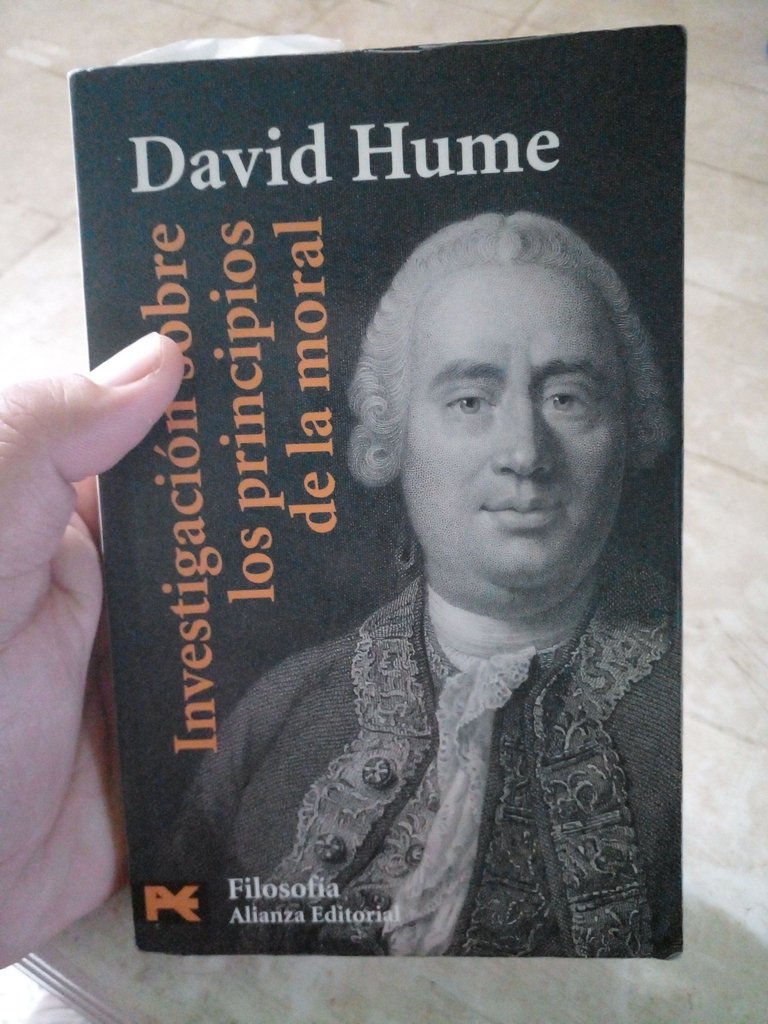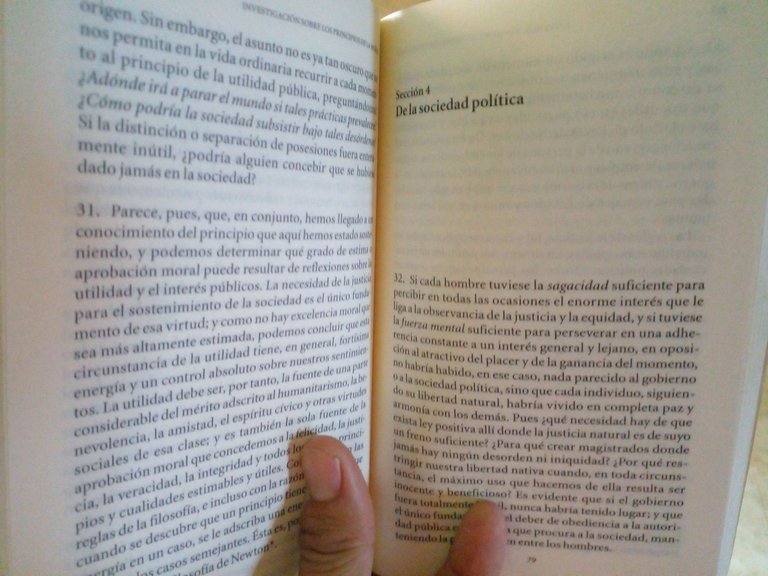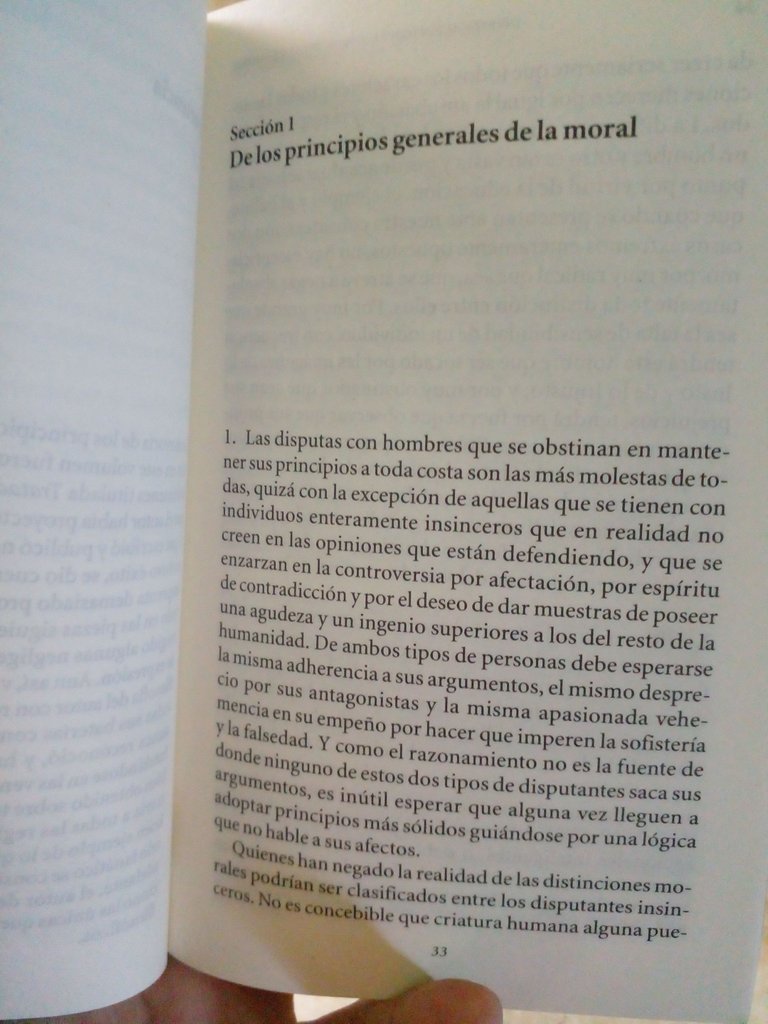RE-Leyendo "Investigación sobre los principios de la moral." Autor: David Hume
VERSIÓN EN ESPAÑOL
Hola amantes de los libros
Bienvenidos

He comenzado por segunda vez la lectura se este texto del filósofo escocés David Hume quien vivió entre los años 1711 y 1776, en medio del siglo de las luces (s. XVIII)
Fue uno de los pensadores más influyentes cuando hablamos de la corriente filosófica del empirismo. En sus 20 años escribió su famoso texto "Tratado de la naturaleza humana". Años después se percató que aquel libro fue algo apresurado, y dedicó a escribir dos obras intentando corregir a si mismo en esas prematuras ideas de su primer texto en sus años de juventud.

Uno de esos textos es ese que les presento hoy, pues la "Investigación sobre los principios de la moral" se concentra en las secciones II y III de su primera obra en la juventud.
Este texto fue publicado por primera vez en el año 1751, y su tesis central se centra en criticar los postulados que han sido propuestos por los filósofos Locke y Hobbes, estos dos básicamente centran sus ideas en que las cuales las aciones morales se remiten a un amor egoista de sí.
En cambio Hume, se centra sus ideas en un aspecto no tan pesimista, para David Hume no todo es tan pesimista y tiene una idea notable sobre la felicidad del genero humano, apartandose del "Homo homini lupus." ( El hombre es lobo para el hombre) de Hobbes.

Cuando hablamos de la filosofía de Hume, hablamos de empirismo, ¿qué es eso de empirismo? Una corriente filosófica que afirma que el conocimiento humano depende las percepciones, de la experiencia. Todo lo contrario a Descartes puesto que su vida gira en torno al racionalismo, que dice que todo el conocimiento humano procede de la razón. .
En este texto Hume muestra su evidente inclinación a la bondad como un aspecto de la naturaleza humana, afirma que somos seres sociales, y que por ello todo ser humano tiene como imposibilidad el vivir en solitario, así que no queda otra opción que una favorable condición hacia los hábitos o principios que promueven el orden social.

Teniendo en cuenta lo antes dicho debo mencionar que Hume toca temas profundamente importantes en el ambito de la moral, como la justicia, la benevolencia, la utilidad y entre otros.
Te recomiendo esta lectura deseo comentarte que si te gusta leer sobre moral y emociones. Debes acercarte a este libro.
Gracias por leer y visitar mi blog

Adiós

Las imágenes son propiedad del autor

ENGLISH VERSION
Hello book lovers
Welcome

I have started for the second time the reading of this text of the Scottish philosopher David Hume who lived between 1711 and 1776, in the middle of the century of lights (XVIII century).
He was one of the most influential thinkers when we talk about the philosophical current of empiricism. In his 20s he wrote his famous text "A Treatise on Human Nature". Years later he realized that that book was somewhat hasty, and dedicated to write two works trying to correct himself in those premature ideas of his first text in his youth.

One of those texts is the one I present to you today, for the "Inquiry into the Principles of Morals" concentrates on sections II and III of his first work in his youth.
This text was first published in 1751, and its central thesis focuses on criticizing the postulates that have been proposed by the philosophers Locke and Hobbes, these two basically focus their ideas in which moral actions refer to an egoistic love of self.
Hume, on the other hand, focuses his ideas in a not so pessimistic aspect, for David Hume not everything is so pessimistic and has a remarkable idea about the happiness of the human race, moving away from the "Homo homini lupus". ( Man is a wolf to man) of Hobbes.

When we talk about Hume's philosophy, we talk about empiricism, what is empiricism? A philosophical current that affirms that human knowledge depends on perceptions, on experience. The opposite of Descartes, since his life revolves around rationalism, which says that all human knowledge comes from reason ... .
In this text Hume shows his evident inclination to goodness as an aspect of human nature, he affirms that we are social beings, and that for this reason every human being has as an impossibility to live alone, so there is no other option but a favorable condition towards habits or principles that promote social order.

Taking into account the above I must mention that Hume touches deeply important issues in the field of morality, such as justice, benevolence, utility and others.
I recommend you this reading I wish to comment that if you like to read about morals and emotions. You should approach this book.
Thank you for reading and visiting my blog

Good bye

Translated with DeppL.com(free version)
The images are property of the author
Philosophers make my head spin, lol. Still, I have always prefered Descartes, as I believe in rationalism as a school of thought. This book sounds like a lot of philosophy, but I did check it out, and the author made a sound argument